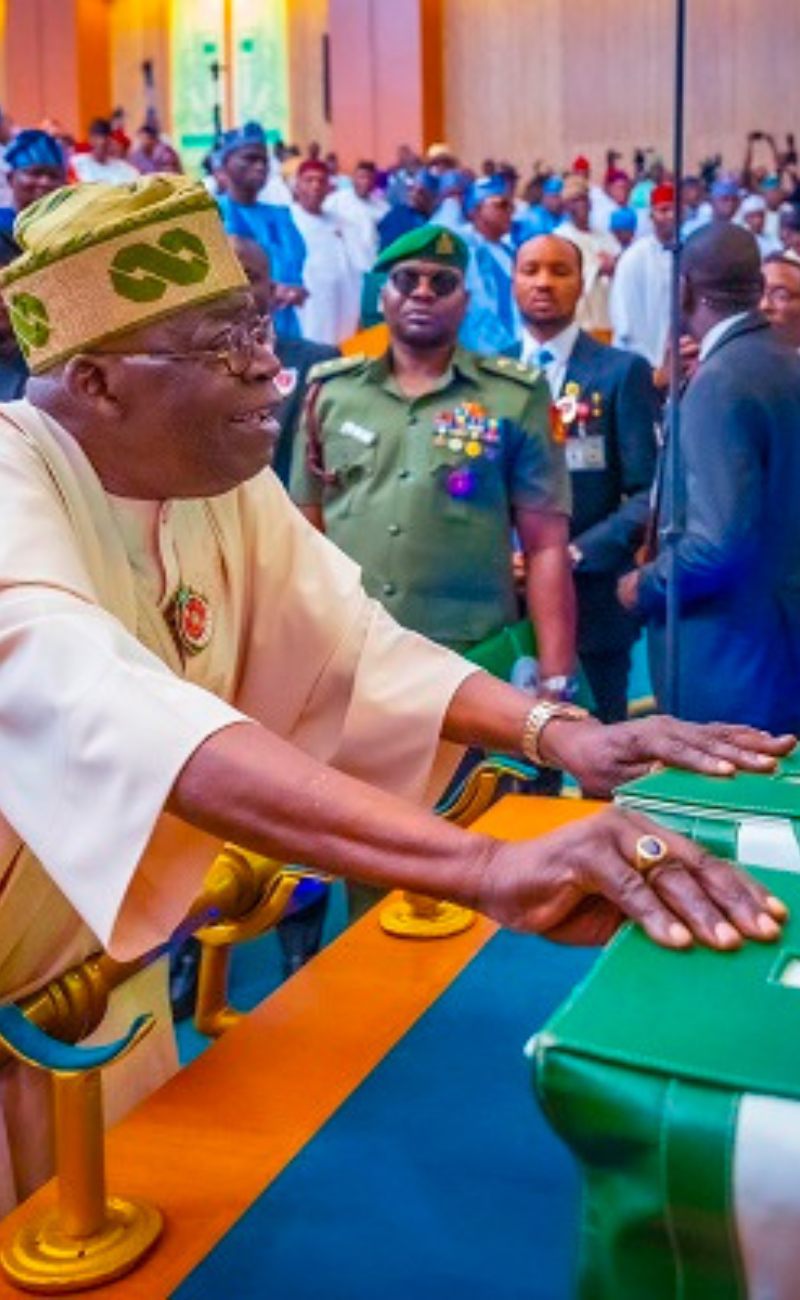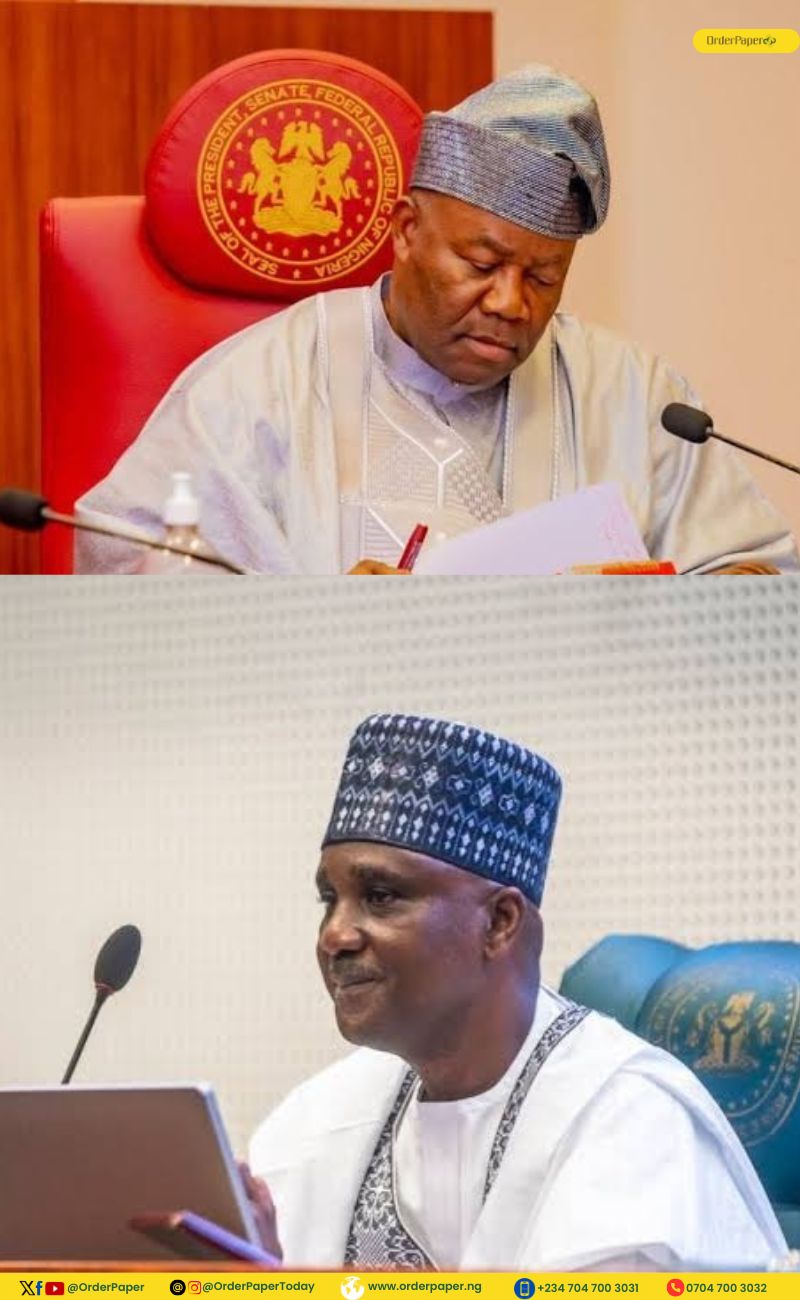Senator Adaramodu, in this exclusive interview with OrderPaper, explains why citizens must take ownership of constituency projects
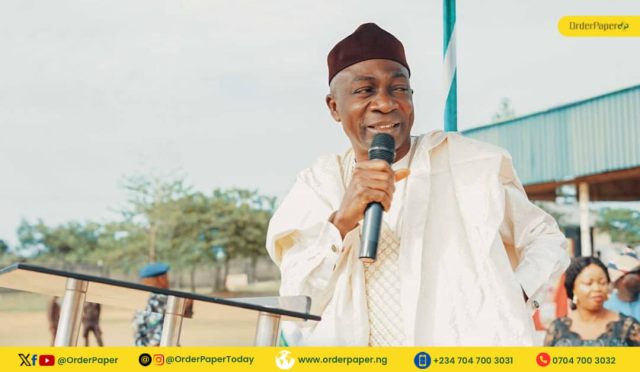
Since the inception of constituency projects in Nigeria there have been misconceptions, poor evaluations and misinformation of the scheme in the public domain. While some acknowledge that such projects help in bringing development to grassroots constituencies, others have continuously criticised it.
Also known as Zonal Intervention Projects (ZIP), constituency projects are generally defined as particular efforts or development projects that members of the Senate or House of Representatives undertake to address the needs of their constituents. These initiatives, which are frequently supported by the public budget and are meant to help the local community within a specific electoral district or constituency, are nominated into the annual budgets by legislators primarily for the socioeconomic development of that community.
As a means to address the misconception as well as to engender citizen engagement toward transparency, accountability, inclusiveness, and effective service delivery in the implementation of constituency projects across Nigeria, OrderPaper, Nigeria’s foremost parliamentary monitoring organisation, engaged Senator Yemi Adaramodu (APC, Ekiti South) on the challenges and prospects of the scheme. Speaking in an exclusive interview with the OrderPaper team, Senator Adaramodu, who is the official spokesperson of the senate, addressed and clarified some of the misconceptions and gave a detailed analysis on his constituency projects. Find excerpts of the interview below:
Q: Can you share some of your campaign promises made to your constituents before winning the election?
A: A legislator is not supposed to have campaign promises because we are supposed to make laws. It is not an executive arm that executes budget. A legislator does not have a budget apart from the ZIP which we are just a vehicle to deliver to the people and which is a miniature of the budget like in my own case, I have only N200 million. So, we have to put projects of that amount in my senatorial district. How can a legislator make campaign promises rather than represent you well? I will make sure that I advocate for you because we are not supposed to be building bridges, it is the executive arm (that does that). The legislator makes appropriation law for the executive arm to go and execute. You can only oversight what they are doing.
It is what they bring as their budget that you talk about and interview them on or that you interrogate them on. And once that one is done, it is not the legislator that is going to execute it, it is the executive. So, the only thing that we do now because there is a misconception in Nigeria. Once you are a legislator, they rate you like a governor, they rate you like a president, they rate you like a minister. They will tell you what have you brought, what have you done, how many citizens have you employed? They will think you are so omnipotent that you must have powers to do all those things. We don’t have to because ours is to make laws and then to do oversight to ensure that what is in the budget and what is in the statutes are adhered to strictly and then to advocate, and the only way we can advocate for our communities is that when we get to Abuja, either through the zonal interventions, is what we can do, because today you need billions and trillions to make any impact. So, if there is a legislator that only can have suggestion on only N150 million, what can that N150 million do in a community or in a constituency of about 30,000 villages? It cannot even build one bridge, it cannot do half a kilometre of a road, it cannot even give rural electrification. So, definitely what we now do is that we need to go hand in hand to MDAs to beg them when they are doing their budget, please include my constituency, include my senatorial district. So, when we include it, I can now go back home and say that I have assisted in making sure I have facilitated rural electrification here, streetlights there, a clinic here, a renovation of a primary school there, because the way Nigerians see legislators, they see them as being so omnipotent that there is nothing they cannot do. So, when you now tell people that, oh, you have come to Abuja to make laws, you have made 1,000 laws, they will say, “who he epp,” but if they want to do naming ceremony, they will call you. If they are covering the roof of their house, if there is a bad storm, you are the one who is going to suffer for it. If they are doing marriage, you are the one who is going to pay the bride price. If they hit their feet on any stone, you are the one who will first of all remove the stone and make sure you put a very good ground there, then you will pay for the treatment of the toe. If you pick calls and you don’t do it, you are in trouble. If you don’t pick calls, you are in more trouble, in bigger trouble. They will now threaten you and say, you are coming back, you are going to meet us here, which they will not tell the executive, which they will not tell the judiciary. The judiciary has budgets, and the legislative arm also has but nobody is asking questions.
You will see Nigerians who will say, why are legislators not part-time? But why is the executive not part-time? Why is the judiciary not part-time? Can’t somebody be in the executive and stay at home and be using his phone to control people to go and do job? Can’t somebody be in the judiciary and come to court only when it is necessary? Where we have copied our own democracy, either in the USA or the UK, are they on part-time? They say, oh, there are too many. How can there be too many? The population of the EU is not up to the population of Nigeria. They have 720 parliamentarians in EU. In UK, they have about 600 parliamentarians and they are just 53 million people. So it is only in Nigeria they will tell you, oh, there are too many, oh, what are they doing there? So what are they doing in South Africa? What are they doing in Ghana? What are they doing there in Dahomey or in the Republic of Benin or in Togo? Why is it only in Nigeria?
Q: How many constituency projects do you have right now?
A: When I came in, you know, we are supposed to operate under the 2024 budget, which is yet to take off seriously. We are still dealing with the 2023 budget, which we are still extending the lifespan, so that there won’t be any abandoned projects. I don’t want to dwell on what I have done when I was in the House of Reps. I gave school uniforms to kids in secondary schools in my zone -free uniforms- because I know many of them, when you see them, tattered uniforms, many of them, their children cannot even come to school because they don’t have uniforms. Their parents could not even afford. I did that. I did POS training for young women to go into POS business. I gave them the tool, I gave them startup funds. I wouldn’t just do training for you and just throw you to the streets. I’ve done three trainings, ICT for youth, because I’m seriously very enamored by that youth interest. After doing training, I would give them startup and empowerment funds. Currently, they are doing boreholes. I have installed the transformers and I’m going to install more in Ilu Omoba-Ekiti. They’re going to do that one now and one in Ilawe-Ekiti. I have been able to make street lights now. They are doing it currently. As we are talking, they have finished that of Ekiti. They are now at Ise Ekiti. They’ve been in Gbonyin, that is Ode, Aisegba, Ijo, Ilu Omoba, and Ilupeju Ijo, Ijero community, Ilasha, Eda Ile, Ogotun. They’ve been in Ikere, they’ve been in Emure, they’ve been in Ise Orun. The budget is just taking up, by the time the budget is in full swing in the next three months, we are good.
READ ALSO: Exclusive: One on one with Rep Abdullahi Musa on Widowhood Bill
Q: How do you ensure satisfactory delivery of constituency projects by responsible parties like MDAs, contractors, etc.)?
A: That’s part of what we have to face as legislators. One, we do oversight functions over the MDAs and then the MDA that is handling either the projects in your community are not likely the ones that you are oversighting. So, definitely, you have to rely on the other committee that is doing oversight functions over them to make sure that they deliver. Then, at times, the release of funds, which might be in staccato manner, might not be straightforward the way we expect it because it is the availability of funds that will determine how soon, how early that a project will be completed.
But by and large, we always get those projects done, especially in my own case, like the ones that I’ve just mentioned, i’ve have gotten them done, even without any serious ado because I will monitor, I will go to the MDAs, I will put their feet on the fire, and I’ll make sure that, at times, if it is necessary for me to threaten, I do that, just to make sure the work gets done. So, that’s why I said that when I was in the House of Representatives, I have nothing less than 135 projects completed.
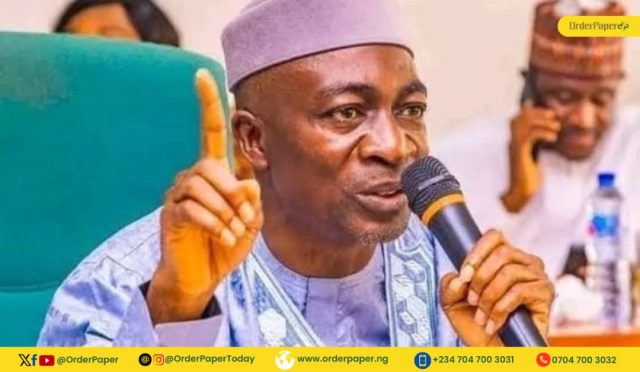
Q: So, do you have any abandoned constituency projects?
A: I don’t. I don’t. In fact, I do to some extent that, when boreholes are sunk in my community, maybe solar, and the solar is not doing well, I will personally use my own money to go and buy a generator and build a generator house, and put it there, and connect. And I will personally be paying stipend for them, for the community leader, to be buying, to be putting fuel there, and make sure they pump water for them. For me, I don’t have any (abandoned project). The halls that I built there, they are all functioning. I put public address system in the halls, chairs and tables in the halls. Then the clinics that I built there, I put all gadgets, all materials there. They are all there, well equipped. There are some schools that I had to build from scratch. At times, I have to even intervene, personally, like recently in Ikere Ekiti, apart from Okekere, where I put new transformer, because they didn’t have light for almost 7 years. I put transformer there, they got them lit up by December (2023), because I insisted that they have to use that electricity for Christmas, which I achieved. Even when the contractor did not do a good job, because when they wanted to put it on, there was a problem, I had to bring down my money, millions for that matter, to make sure that it is put into use. And again, just about one month ago, the transformer in Okerekere area, very close to Ado road, they had a problem, and then the community wanted to start contributing money, so that they can buy a pillar and rejuvenate the transformer. I had to go to the community myself, and I gave them all the money and they are enjoying the light now, about 2 or 3 weeks ago, they started enjoying the light. So, that’s so much that I do personally to intervene. I don’t even wait for government job or government contracts, or government project. I think there should be a pat on the back for those who do well. There should be.
Q: What roles do you expect of constituents in the delivery and post-delivery of the projects?
A: Yes, well, they have to take ownership. They should not look at everything as government’s thing because at times, when you sink boreholes for them and they see any damage there, maybe a platform where they fetch water; some of the community people might not even bother, they just look at it as government’s thing. There is a community that I gave a new 500KVA transformer installed. We were about to put it on the national grid, some people came there, they vandalized and stole some of the components. I think the communities must watch over this thing, because they are the people that are enjoying it. So when we don’t provide, they make noise, “oh, we are in darkness, oh, this government is not doing this,” but when we do it for them, they will allow vandals to cannibalize all those things. And so, at times, you might feel so discouraged that, ah, what is the meaning of this? We build new schools, buildings, and whatever, they start writing so many things on the walls. So I think the communities must take ownership. Even when you want to empower some people at times, you give them keke napep (tricycle) to give and be doing little, little transport business, some of them will sell it at very ridiculous prices and when you hear of it, you feel discouraged. When you get a keke napep for about 1 million, and you give it to somebody, “oh, I want you to get something doing, so that you can earn something for your home,” and they now take it to the market and sell it for N250,000. When you hear of it, you feel so discouraged that, is it worth it? I’ve always been saying it, when you talk of leadership in Nigeria, talk about the followership. What’s the followership doing? What are they doing to encourage leaders? What are they doing? So they should be able to take ownership at times, to take what is given to them, and then ensure that you are encouraged to do more.
Q: Do you think that subnational and local governments should have a role in constituency projects?
A: They already have because when we want to site those things, we send our people there, they determine where it will be sited. For example, when we got to Agbado Ekiti, in Gboyin local government, I want to do either hall, palace, or whatever, so we got to the town, they said they want the palace to be completed, they need a new palace. That is what we are doing now. So when we got to Aisegba, they said their town hall must be modernized, so that is what we are doing. When we got to Ekiti east, they said, oh, they need water. They said they need one in the general area of Ombo Ekiti. They need one in the Araromi area in Ombo Ekiti. There is no way you can sit down in Abuja and just be electing or selecting where some things will go, even where they don’t need it. For me, for example, whenever I want to do anything like that, I involve the local government chairman, the elders in the communities, the Obas, if it is a town, to sit down and determine where this goes and I don’t even limit myself to only this thing. Even schools around, like the College of Education, in Ikere, I was the one who gave them the shuttle vehicles that take them from town to the campus because I know they have so many students, they are always very stranded, I can afford two, and I gave them. I was the one who did all the street lights in the school, so, I don’t limit myself to all these things. I look at it as those in the towns, who are my constituents, those ones who come together to be attracted to my zone because of one facility, either educational facility or whatever, then we have to take care of them. The NYSC orientation camp is in my senatorial district. I am the one who did all the street lights within the camp.
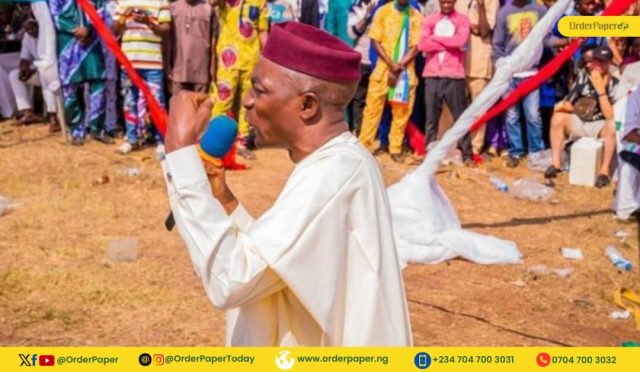
Q: Many believe constitueny projects should be scrapped because it is alleged to be ridden by corruption. What is your view on this?
A: What is the misconception? Lawmakers do more than the ZIP. For example, is there any Reps or Senator that attracts only about N169 million projects to his constituency? Okay, for somebody like me in my senatorial district, I have 68 towns and villages and all the towns and villages have Obas nd I have to be responsible to them not minding whether I’m a lawmaker or whatever, I have to be responsible to them. Now, if I have a ZIP of less than N200 million, how can I share that N200 million among 68 communities in projects? Can that take more than one project? No. It means that I have to stay 68 years to touch 68 communities. How did I make it that I have to touch the communities with town hall, palaces, electricity, transformer and this and that? Is it not more than what is available for ZIP? So, that one will show you that if I would have attracted anything that is above 2 or 3 billion naira projects to my constituency, then it means that I couldn’t have embezzled just 150 million. So, that one will show you that it means that that N150 million is just a drop in the ocean in what I have attracted to my zone. Then, the issue of a constituency project which we call the ZIP; no legislator does it by himself. The only privilege is that they will give you a form to fill. Where and what do you want and state the area. That’s the only thing you are given chance to do. They will tell you, you can nominate project worth maybe N100 million, then, tell us in your constituency, what do they want. So, it is you that will think N100 million, what can it cover? Okay, community A wants water, one borehole, community B wants renovation of their clinic. If you write more than that, they will cancel it because they are the ones who will value, its not you, because when you get to the ministry, the ministry can say a borehole is cost so so so amount, you are not the ones who will tell them. So, when they give it to you to consult, what I will use to consult a borehole in my house, is that what they will use to consult a bottle from the ministry. And mind you, out of that ZIP N100 million, they will take VAT 7.5%, remove it from there, stamp duty, remove it from there. 5% tax, remove it from there. So, it is less than that again. That’s almost 18% moving out of it. It is the same ministry, that will now determine how much are we going to dig one borehole for this place. If they say they want to dig it for 5 million or 10 million, are you the one who will talk? If they say, Oh, Senator Adaramodu, I know you want to dig borehole, okay, we are going to give you all the money, go and dig borehole. We expect you to give your people 20 boreholes. We are going to monitor the 20 boreholes. But if it is a ministry, will they do it in a way that you do borehole in your home, that you are drinking?
Some of these people will do borehole, it will work this year, it will not work next year. I have told you, most of the boreholes that they dug for me, solar, the solar didn’t work for two weeks. I was the one who went to buy generators with my own personal money. Some of them, I link them to the national grid and I pay NEPA every month. Because if I don’t do that, it is me, they will say, “I have done an abandoned project. Oh, he has given us fake boreholes, look at Senator Adaramodu, he has cajoled us. He has deceived us. He is a thief. Maybe he has taken N50 million on one borehole and he dug the borehole for N200,000.” So because of that, I have to go out of my way. I make sure I don’t spoil my name. But the ministries that do it, you cannot go back to them. If you go back to them, what will you do? You don’t have to sign out for them to collect their money. They don’t rely on you to collect their money. They will take themselves there to go and look at it. Oh, he has finished it. He has done the job. So pay him. So they pay him. So it is only the legislator that all of you will indict, you won’t talk about them.
READ ALSO: NASS to partner with CSOs to strengthen execution of constituency projects – Barau
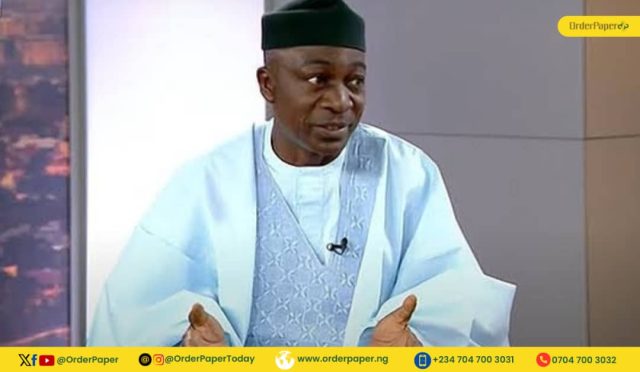
Q: Is there any national policy framework guiding the zonal intervention project?
A: There is only legislative policy. The legislative policy is that just a little portion, just a little, that the legislators must nominate projects to be done as a stopgap or to fill in some gaps that might not be covered. Little, little gaps, not serious gaps. That’s the only policy that is there. So unless the only thing I want to suggest is this. When they want to make a budget, you let the executive tell the legislator since they are the representatives of the people, to go to their constituencies, collate what they want, give it to the executive, let the executive now reflect that in their budget. If they do that, they don’t even need ZIP (constituency projects). So if there is a budget of 28 million naira for a country, and my own constituency is still part of that country, somebody must not sit in an air-conditioned room in Abuja and be thinking of what they did in Ilawe-Ekiti, where he has never been to in his life, where he cannot even locate on the map. Instead of doing cut and paste, tell Adaramodu, okay come, I will now tell them in Ilawe they lack clinics, in Ogotun the lack school, in so so so, the lack motor park. So let me just bring it. If you can now do 10 out of 50, now let me know that this 10 will go. I will now go back home and tell them the federal government has approved that you are going to get motor park and people will be expecting it. But when that one is absent, that was why the National Assembly said, ah, look, can we be here and this people will be pulling us up and down? The state will tell you they don’t have funds. If you start making noise at the state, then you are in trouble because you are a politician.
Q: Finally, what can CSOs to make your noble intentions on constituency projects realized and improved upon?
A: That is what I’ve suggested, tell the national government that look, tell legislators to go home and collate the views of their people. Reflect it in your budget. So let them now monitor it. Now, if they want to term it as ZIP, if they want to say constituency projects, the federal government through their offices and you the NGOs can come to an agreement. We have three senators and six House of Representatives’members, come to Ekiti. Yes, people of Ado and environs, the federal government has approved for your legislator, the provision of borehole, the provision of this, provision of that. Please, we want you to monitor it.
STAR Check: Nigerians, particularly, constituents of Ekiti South district, can keep tabs on the legislative performance of Sen. Adaramodu throughout the 10th senate here.

